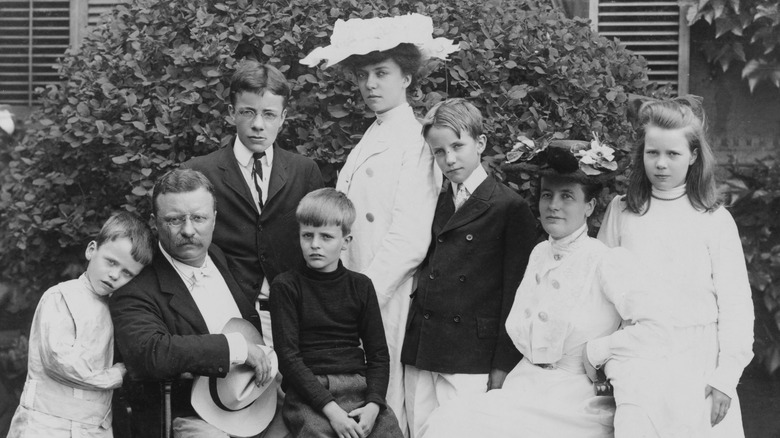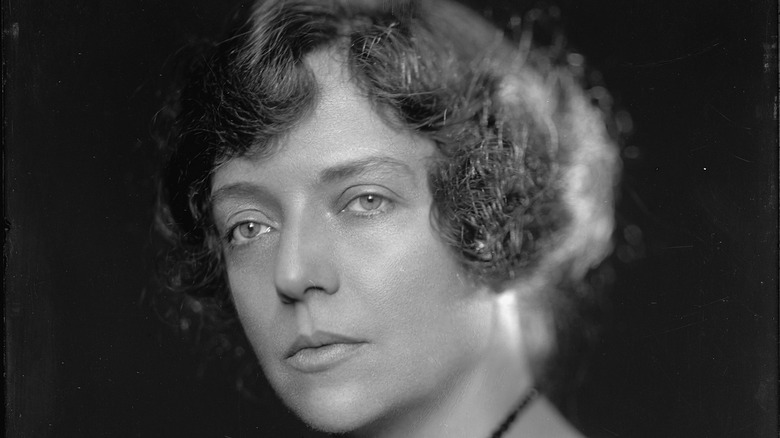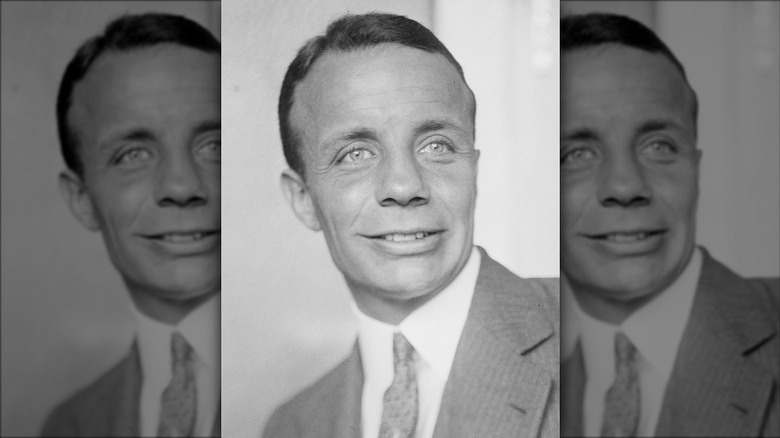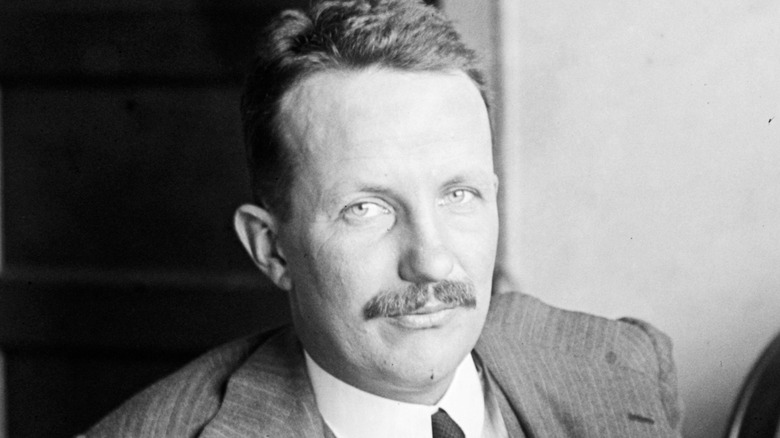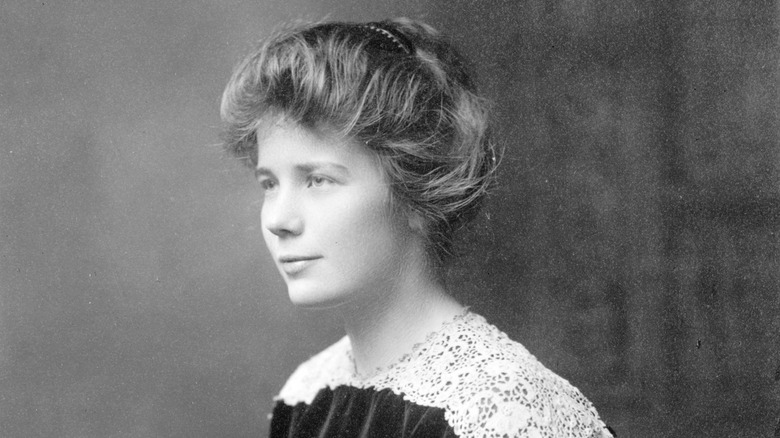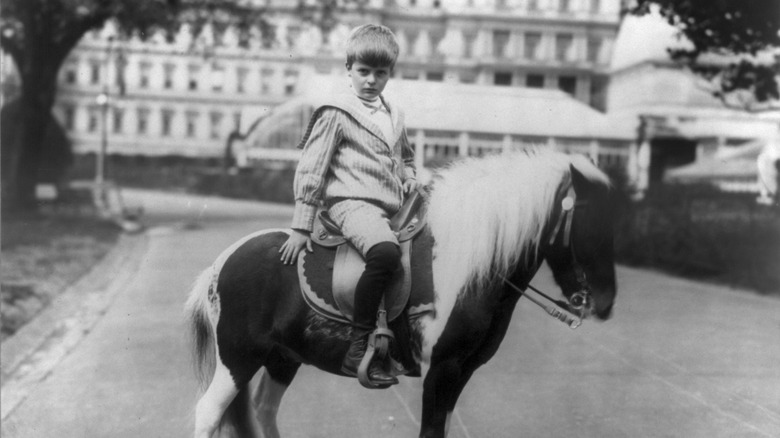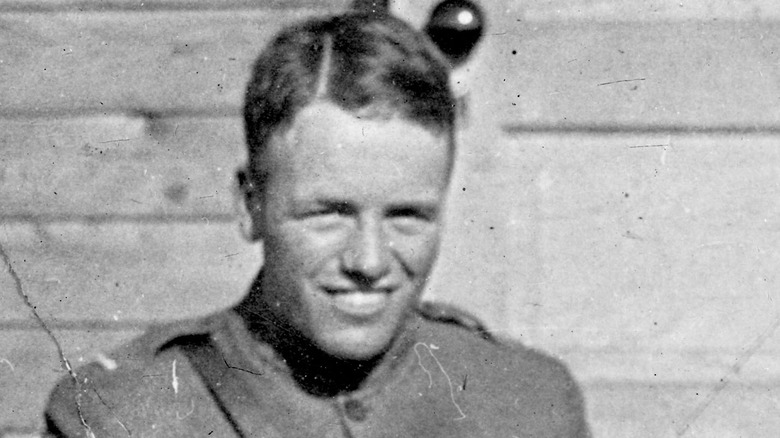What Happened To Theodore Roosevelt's Children?
Theodore Roosevelt was the 26th president of the United States, serving from 1901 until 1909 and running for re-election with his own Progressive Party in 1912. In addition, he gained fame in his roles as soldier, explorer, naturalist, author, and diplomat, winning a Nobel Peace Prize for his role in ending the Russo-Japanese War. He muscled the Panama Canal into being! He fought big business! He inspired the teddy bear! His face is on a mountain!
But that wasn't all he did: Theodore Roosevelt was also a father. In fact, he had six children: one with his first wife, Alice, and five after Alice's death with his second wife, Edith. The six Roosevelt children all became notable in their own way, with some making headlines and some meeting tragic ends. In one way or another, they all made themselves part of their father's looming legacy. Read on to discover the ups and downs of the lives of the children of President Theodore Roosevelt.
Alice Roosevelt Longworth: Socialite and influencer
Theodore Roosevelt's oldest child — and only child with his first wife Alice Hathaway Lee — was Alice Lee Roosevelt, born in 1884. Her mother died just two days later, the same day that her paternal grandmother died, sending her father into a deep depression. He never called Alice by her first name — the same as her mother's — but only ever "Baby Lee." Roosevelt sent the baby Alice to live with his sister until he remarried in 1886. Afterward, Alice lived with her stepmother and eventually five half-siblings wherever her father's career led them, which by 1901 meant the White House.
Alice became a celebrity first daughter, beloved by the American public for her beauty and acts of teenage rebellion, such as smoking and gambling. In 1906, Alice married Congressman Nicholas Longworth of Ohio and switched her focus from socializing to politics. She held salons in her home in which leading minds were invited to discourse on various ideas, at which she cemented her reputation as a sparkling wit, especially in her criticisms of the New Deal politics of her cousins, Franklin and Eleanor Roosevelt. She was an ardent supporter of American isolationism and played a significant role in persuading the United States not to join the League of Nations and to remain neutral in World War II until Pearl Harbor. Alice Roosevelt Longworth, known as "the Other Washington Monument" for her powerful influence in Washington society, passed away in 1980 at age 96.
Theodore Roosevelt Jr.: Soldier and politician
Theodore Roosevelt's second child, first son, and first child with his second wife, Edith Kermit Carow, was Theodore Roosevelt Jr., known as "Ted." Although Ted, born in 1887, shared many of his father's interests, such as hunting and exploring, he felt considerable pressure as the son and namesake of the president, which caused him to suffer migraine headaches through much of his young life. Nevertheless, he followed his father's example by attending Harvard, where he performed well, and after graduation, he became a partner in an investment banking firm in Philadelphia. But his real desire was to serve in the military.
After marrying Eleanor Butler Alexander, with whom he would have four children, in 1910, Ted got his chance to serve in World War I. He and his younger brother Archibald were commissioned as officers in 1917, and Ted and Eleanor went to France, leaving their children with Ted's mother as Eleanor worked as a supervisor for female volunteers. In 1918, Ted was shot in the knee while still suffering the effects of a gas attack, and his life was saved by his brother-in-law, a doctor serving in the war.
Ted then entered politics, serving in the New York Assembly, then as Assistant Secretary to the Navy, governor of Puerto Rico, and governor of the Philippines. When World War II began, he re-enlisted and became a brigadier general. Ted earned a Medal of Honor for his actions at Normandy in 1944, but died a few weeks later of a heart attack. He was 56 years old.
Kermit Roosevelt: Adventurer and travel writer
The third eldest child of Theodore Roosevelt was Kermit Roosevelt, born in 1889 to Roosevelt's second wife, Edith. Kermit had a great love of travel and adventure, and in 1909, he accompanied his father on an African safari in exchange for the promise that he would excel in his studies at Harvard, which he did, graduating in just three years. In 1913, Roosevelt and Kermit went together on their famously ill-fated expedition to Brazil in search of the source of the River of Doubt. Kermit traveled widely around the world and was skilled in picking up new languages, becoming proficient in at least nine.
Besides publishing books about his travels, Kermit also served as a bank manager in Buenos Aires before joining the British Army in 1916 after the outbreak of World War I. When the American Expeditionary Force arrived in Europe in 1918, he was made a captain in the U.S. Army. Kermit was the only one of his brothers not to be seriously injured in the war. Afterward he founded a steamship company, but was hit hard by the Great Depression and alcoholism. Despite attempts by his family to help him by getting him a post in the U.S. Army once World War II began, Kermit was nevertheless discharged from the army as medically unfit due to his alcoholism in 1943. In June of that year, Kermit took his own life at Fort Richardson in Alaska, where he is still buried today.
Ethel Roosevelt Derby: Nurse and community leader
The youngest daughter of Theodore and Edith Roosevelt was Ethel Carow Roosevelt, born 1891. In contrast to her headline-making half-sister Alice, Ethel was much more private and familial, helping take care of her younger brothers and assisting her mother in the administration of the White House staff. She married surgeon Richard Derby in 1913, and the two had four children together. When Derby went to France in 1914 to aid in the war effort, Ethel went with him and served as a nurse in the American Ambulance Hospital, as well as volunteering for the Red Cross, an organization with which she would work for the next six decades.
After returning from the war, Ethel became a leader in their home community of Oyster Bay, New York, working for the local Red Cross and nursing service, volunteering at her Episcopal church, and advocating for low-income housing to help fight racial discrimination. After her mother's death in 1948, Ethel became the de facto center of the Roosevelt family, working to secure the legacy of her family and her father in particular by becoming a trustee of the American Museum of Natural History in New York (co-founded by her grandfather), turning the Roosevelt family home into a museum, and helping to create the Theodore Roosevelt Nature Center on Long Island in conjunction with the Audubon Society. Ethel died at age 86 in 1977 and is buried with her husband and parents in Oyster Bay.
Archie Roosevelt: Soldier and financier
Archibald Bulloch Roosevelt, better known as "Archie," was the second youngest son of Theodore and Edith Roosevelt, born in 1894. Just 7 when his father became president, Archie spent most of his childhood in the White House, though he was known to be much quieter than his siblings. Like his brothers, he attended Harvard, from which he graduated in 1917, the same year he married Grace Lockwood. After graduation, Archie worked at a carpet company until World War I, where he served with distinction as an officer and was noted for his bravery and keeping his cool under fire. He received numerous citations for his courage, including France's Croix de guerre, but he was given a full disability discharge after suffering major damage to his leg from an artillery bombardment.
After the war, Archie worked with Sinclair Consolidated Oil Company but distanced himself after the Teapot Dome scandal, moving instead into the finance industry. When World War II began, Archie asked his cousin, President Franklin Roosevelt, to appoint him to an officer position and was made a lieutenant colonel. He once again served with distinction before receiving a full disability discharge, making him the only American soldier to be medically discharged for the same injury in two wars. Following World War II, Archie supported numerous conservative organizations, especially the John Birch Society. He died in 1979 at the age of 85 and is buried with much of the rest of his family in Oyster Bay.
Quentin Roosevelt: Combat pilot
The youngest child of Theodore Roosevelt was Quentin Roosevelt, born in 1897, just four years before his father became president. Quentin was well known for his wild antics on the White House grounds together with a group of other children — including the son of future president William Howard Taft — who gained the name "the White House Gang" for their misadventures. Among other rambunctious behaviors, Quentin and his pals were known to shoot spitballs at presidential portraits and pelt Secret Service agents with snowballs. Like his brothers, Quentin also attended Harvard, where he met Flora Whitney, granddaughter of railroad tycoon Cornelius Vanderbilt, to whom he became engaged.
Unlike his brothers, however, Quentin didn't finish Harvard. He dropped out at the onset of World War I to join the military. He signed up for the United States Army Air Service and became a combat pilot. On July 14, 1918, during the Second Battle of the Marne, Quentin's plane was surrounded by three enemy fighters. He was shot down behind enemy lines and died there near a village in France, at the age of 20. He was initially buried at the crash site by the Germans out of respect for his father, but in 1955 his body was moved to be next to his brother Ted's in Normandy. As of this writing, Quentin Roosevelt is the only child of a U.S. president to die in combat. Theodore Roosevelt was reportedly devastated by the loss of his youngest son and remained so until his own death a few months later.
If you or anyone you know needs help with addiction issues or is struggling or in crisis, contact the relevant resources below:
- The Substance Abuse and Mental Health Services Administration website or contact SAMHSA's National Helpline at 1-800-662-HELP (4357).
- Call or text 988 or chat 988lifeline.org
